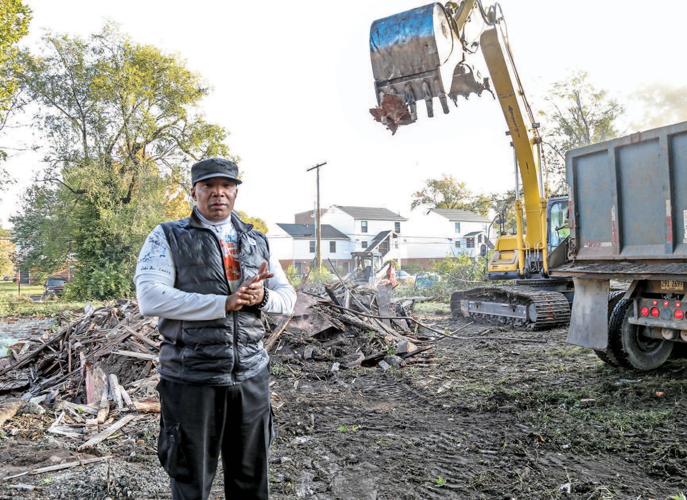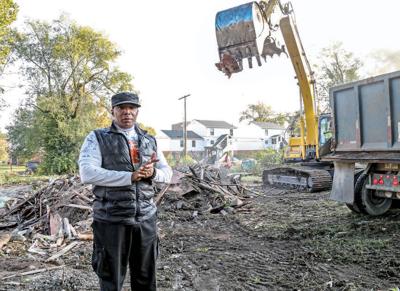Paula Neely had not been sleeping at night. She was too afraid that someone was going to shoot up her house to kill her only son. Then, she heard a radio advertisement about Better Family Life’s centers that de-escalate gun conflicts.
“It was right on point because my son was just shot at a day before,” Neely said through tears.
She called the hotline, and James Clark, director of Better Family Life’s community-outreach programs, answered the line. He immediately asked her for information about the conflict and arranged a meeting with her.
“The next thing you know I got another phone call, and he said, ‘Ms. Neely, you don’t have to worry anymore. Everything is settled,’” Neely said. “That was like the best news that I ever received in my life.”
Not only was Clark able to “magically” settle the dispute, she said, but he was also able to help both Neely’s son and his adversary get help in other ways, including jobs.
“My son didn’t have that male constructive support at home,” Neely said. “And I think that’s what we lack in our community and where Mr. Clark steps in with the male figure. It doesn’t actually have to be a father figure. It can just be a mentor.”
Neely’s story is similar to that of many families who have saved their loved ones’ lives by calling that same number: 314-203-3900.
The Gun Violence De-escalation Centers, which opened in December 2016, are one of many community-outreach services that Better Family Life provides the city’s most vulnerable neighborhoods. The centers were born out of the Neighborhood Alliance, which started out as volunteers in the community knocking on doors in troubled neighborhoods every Saturday and helping to connect individuals with resources. The Neighborhood Alliance has now formalized into having 14 full-time staff members dedicated to doing this work every day, while adding case management and data collecting to the process.
As the community’s trust began to deepen, Clark’s team started getting calls asking for help in preventing gun conflicts.
“I sat down with my team, and asked, ‘What have we learned from this?’” Clark said. “We learned that third-party people who knew of a conflict were willing to come forward with information and give us an opportunity to de-escalate the conflict.”
With a grant from Missouri Foundation for Health, Better Family Life opened two full-time de-escalation centers with five staffers, and contracting with four therapists. Both are located in churches.
However, it hasn’t been enough.
“It’s gut-wrenching, and it’s very painful,” Clark said. “We had to pull the gun violence de-escalation ads off the air because we did not have the staff dedicated to go out and do a quality job. We understand that we have to de-escalate conflicts within 72 hours. So it's a 72-hour dash to where we want to have both parties signing the truce.”
Any time the ads would run, the calls would flood his line shortly after, Clark said.
“We are now saying to our corporate partners and to our funders, ‘Let us scale up,’” Clark said. “All we’re going to do is save lives.”
He is seeking sponsors for 50 staff members, he said.
“Give me 50, and I’ll change St. Louis in less than a year and a-half for future generations,” Clark said. “It’s not going to take five years. It will be evident in a year and a-half that crime is going down.”
The program has already gained national attention, and Clark recently presented to attorney generals and community organizations around the country in meetings set up by Jeff Jensen, the U.S. attorney for Eastern Missouri and a strong supporter of the program.
It’s one reason Clark will receive the 2018 Nonprofit Executive of the Year Award at the St. Louis American Foundation’s 19th annual Salute to Excellence in Business Awards & Networking Luncheon on Friday November 30.
‘It was a blessing for us’
However, Clark said they have to put out fliers advertising the program “scarcely” because they are only able to de-escalate about eight conflicts every three weeks, even though the need is much greater than that.
Samuel Wallace, 32, found out about the de-escalation centers when he saw a flier at a gas station.
Not long before that, he had been walking in his former Spanish Lake neighborhood and became the target of a drive-by shooting. He was able to evade the shots that day, but he was constantly looking over his shoulder every day afterwards. And his natural instinct was to retaliate.

“Now that I have three kids, I have to think before I act,” Wallace said.
After calling the hotline, he sat down with Clark.
“Talking to Mr. Clark, it made me look at things in a whole other light,” Wallace said. “Normally I wouldn’t even talk to nobody about anything that’s going on with me. Since I’ve been here, I talk to people more and don’t walk around with a chip on my shoulder, like everybody is out to get me.”
Clark helped Wallace move out of Spanish Lake and got him into therapy to deal with some of the issues in his family life.
“It’s not something you have to be ashamed of coming here,” Wallace said, “because they do what they say, they are going to do. If it wasn’t for them, I honestly don’t know where I would be right now.”
Melvin Askew’s son was being “hunted,” he said. His adversaries had already shot at him on two occasions. The second time they hit him but didn’t kill him. Clark and Askew both came to the conclusion that his son had to leave town; that was his only option. Clark reached out to the courts to help the family past a probation barrier, and he was able to leave Missouri.
“It was a blessing for us to be able to do this, and now my son is living in another city about a month away from getting off of probation,” Askew said. “He was able to find a decent job, has his own apartment and now actually has his boys down with him.”
A new social-work paradigm
On a Friday afternoon, Clark met with his Neighborhood Alliance team, who are all cross-trained to de-escalate conflicts and knock on doors to do needs assessments and case management. The meeting looked a lot different than the typical room full of social workers. It was majority African-American men under 40, sporting tattoos and dressed in street clothes.
“Our outreach staff, each of them is uniquely qualified because of where they came from, their life experience, and the obstacles they had to overcome – most of them literally from birth,” Clark said.
Many of his “solid team members” come from underserved neighborhoods and have spent time unemployed, in jail and raising children at a young age.
“Those lessons are the things that have prepared them for going out in the community and effectively inspiring people,” Clark said. “What they know, you can’t learn from a college campus.”
Clark said he doesn’t bother looking at resumes anymore because they don’t tell him if the individuals are able to hold a conversation with five guys on a street corner dealing drugs. They can’t tell him if they can sit in a living room with a single mother who needs help getting her teenage sons under control.
“They do strong social work for the new social-service paradigm. We see this model as being cutting edge. And we see the outreach-worker position being what the case-worker position once was. When you look at the old social-service construct, which is the current social-work construct, the case worker was the most touted position,” Clark said.
“We’re saying that because of the depth of dysfunction in our neighborhoods, the most important position in social service organizations moving forward is the outreach worker – the man and woman who is able to immerse themselves in the neighborhood and challenge the culture of the neighborhood. And that’s why we have to empower the individuals who know this area the best.”
Clark has made it his life work to serve the community’s most vulnerable, said Michael P. McMillan, president and CEO of the Urban League of Metropolitan St. Louis. McMillan first met Clark 30 years ago when McMillan was volunteering in the community as a high school senior. Clark was a couple years older.
“Back then, it was taking trash bags and rakes and shovels up and down Dr. Martin Luther King Boulevard,” McMillan said.
Just on Saturday, October 27, Clark helped lead several construction companies and community groups to tear down 12 vacant buildings in North St. Louis through BFL’s Clean Sweep initiative. The Greater Ville neighborhood was lined with giant excavators and hauling trucks. The Urban League also teamed up in the effort.
“He still has that heart of gold and commitment to the community,” McMillan said. “It’s now manifesting itself on a whole new level. Now people are starting take note of the impact he’s having and learn about his work, not only in St. Louis but across the country.”
The 19th annual Salute to Excellence in Business Awards & Networking Luncheon will be held Friday, November 30 at the Ritz-Carlton Hotel St. Louis, with a networking reception at 11 a.m. and luncheon program at noon. Tickets are $100 for Preferred/VIP seating and $75 for general admission. Call 314-533-8000 or visit www.stlamerican.com for more information or to purchase tickets.




















(0) comments
Welcome to the discussion.
Log In
Keep it Clean. Please avoid obscene, vulgar, lewd, racist or sexually-oriented language.
PLEASE TURN OFF YOUR CAPS LOCK.
Don't Threaten. Threats of harming another person will not be tolerated.
Be Truthful. Don't knowingly lie about anyone or anything.
Be Nice. No racism, sexism or any sort of -ism that is degrading to another person.
Be Proactive. Use the 'Report' link on each comment to let us know of abusive posts.
Share with Us. We'd love to hear eyewitness accounts, the history behind an article.